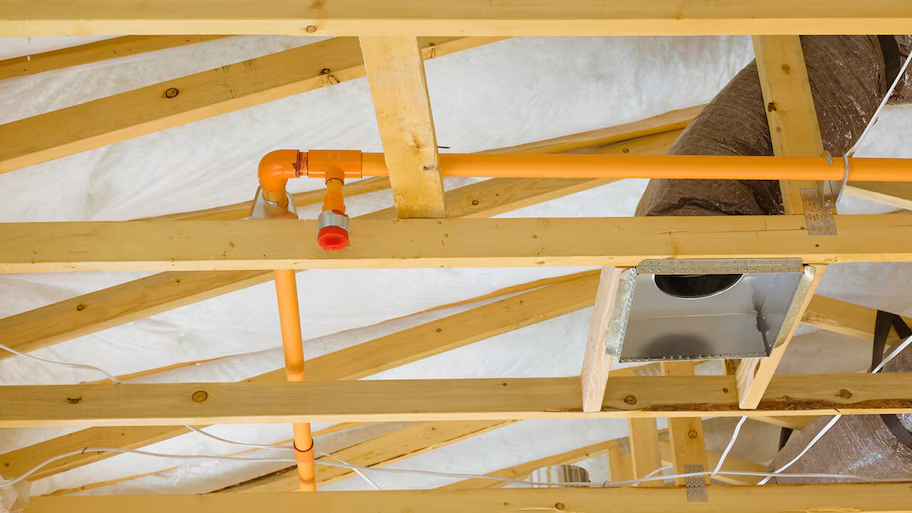
Budget for home fire sprinkler system costs based on factors such as home size, pipe material, system design and type, labor, and more.
Installing a smoke detector costs an average of $115


On average, professional smoke detector installation costs between $70 and $150 with an average of $115.
Key factors affecting installation costs include detector type, power source, and additional features like smart technology.
There are two main types of smoke detectors: Ionized and optical.
Hardwired smoke detectors are more expensive than battery-powered ones but offer enhanced safety features.
Contractors (or licensed electricians) charge about $50 to $100 per hour to install a smoke detector, and professional installation is recommended for safe and effective results.
This article was updated using automation technology and thoroughly reviewed for accuracy by HomeAdvisor Editor Ryan Noonan.
Smoke detector installation costs between $70 and $150, with most homeowners spending an average of $115. Costs vary depending on your choice of detector type, power source, and added features. Budgeting wisely and hiring a professional can guarantee optimal performance and complete peace of mind.
Your final smoke detector installation bill hinges on a handful of variables—detector style, power source, any needed wiring, and the bells and whistles you add.
There are two main types of smoke detectors: ionization and photoelectric. Ionized detectors, costing between $5 and $25, are best at detecting fast-flaming fires. They sense small particles from rapidly burning materials.
Photoelectric detectors, priced between $10 and $30, are better at detecting slow, smoldering fires. They use a light beam to detect larger smoke particles from these types of fires.
For comprehensive protection, consider installing both types or choose a dual-sensor detector that combines both technologies.
The National Fire Protection Association recommends that homes have both ionization and photoelectric smoke detectors. Dual-sensor (combination of ionized and photoelectric) smoke detectors cost between $40 and $150+.
| Smoke Detector Type | Average Cost |
|---|---|
| Ionized | $5–$25 |
| Optical | $10–$30 |
| Dual-sensor | $40–$150+ |
Hardwired alarms start at $15 and climb to $80, while battery-only models cost $5 to $50. Because a wired unit ties into your home’s electrical system, expect to pay an electrician $50 to $100 per hour for the hookup. If you don’t already have the necessary wiring, your total cost for installing a hardwired unit could reach $500 or more.
A big perk of wired units is interconnection—when one alarm goes off, every alarm in the house also does, so you never miss the warning.
Add-ons like smart technology bump the price to $50 to $150+, but they repay you with sharper alerts and seamless smart-home integration. While smart detectors have an added cost, they earn their keep by pinging your phone when smoke hits the sensor. Even if you’re miles away, you can call 911 and protect family members or pets. They’re one piece of a growing smart home toolkit—full smart home systems cost an average of $900.
Going DIY trims labor fees, but you’ll need wiring know-how and a solid handle on local codes, especially with hardwired models. A misstep could leave an alarm silent when you need it most. Pros wire, test, and certify every unit, so if you’re on the fence, call in a licensed installer for guaranteed peace of mind.
Smoke detectors are essential for your home's safety, but the costs can add up. Here are some tips to keep your installation budget-friendly:
Choose a combination of carbon monoxide and smoke detectors to reduce the number of devices you need.
Opt for battery-powered detectors to save on materials and labor costs.
Look for sales or discounts at your local hardware store.
Get quotes from multiple smoke detector installation pros in your area to find the best deal.
Schedule smoke detector installation alongside other projects, like fire sprinkler installation, to save on labor fees.
No place is more important than your home, which is why HomeAdvisor connects homeowners with local pros to transform their houses into homes they love. To help homeowners prepare for their next project, HomeAdvisor provides readers with accurate cost data and follows strict editorial guidelines. After a project is complete, we survey real customers about the costs to develop the pricing data you see, so you can make the best decisions for you and your home. We pair this data with research from reputable sources, including the U.S. Bureau of Labor Statistics, academic journals, market studies, and interviews with industry experts—all to ensure our prices reflect real-world projects.